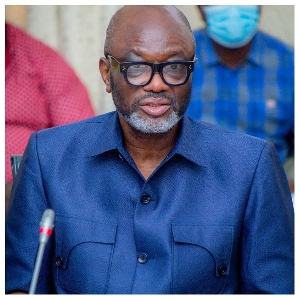The Ghana Union of Traders Association (GUTA) has urged the government to adopt alternative sources of energy, including solar, to reduce the country’s heavy reliance on hydro and thermal power.
The short-to-medium term measure, Dr Joseph Obeng, President of GUTA, said would ensure a more reliable and affordable energy mix to boost the growth of businesses, spur trade and augment Ghana’s economic stability drive.
Dr Obeng said this in an exclusive interview with the Ghana News Agency on Wednesday, April 24, in Accra, and called for the integration of solar energy into the national grid.
He said not doing so could worsen the erratic power supply, with far-reaching consequences – crippling of businesses, increasing noise pollution, and risk causing fire outbreaks in markets due to congestion amid high use of generators.
He said the call had become necessary because the power outages were becoming persistent with no clear information on what the government was doing, or any indication of the challenge being solved anytime soon.
“Our over dependence on hydro and thermal is getting embarrassing, especially when we have alternative energy sources that abounds and all that we need is a clear policy to solve that,” Dr Obeng said.
“It [solar] is capital intensive and expensive at the initial stage, but if there’s a clear policy that your power will be credited to you, almost every household will have power and offload it to the national grid,” he said.
He, therefore, encouraged the government to provide a policy support system “… and make sure that they compensate people who are ready to provide these alternative sources and put it on the national grid”.
He indicated that while some businesses had planned to procure generators, others had already done so to ensure productivity, but that would be an additional cost that consumers would have to pay.
“People are using generators, but the noise alone does not create a good ambience for trading activities to go on. There’s also discomfort because we must trade under unbearable heat, and this isn’t what we need,” the Trade leader said.
He also stated that the recent power outage was negatively affecting digital trade, explaining that “each time the lights go off, it slows business because some of the platforms become inaccessible.”
“Already, businesses are in a state of stagnation because of the effects of the previous years’ economic crisis, and it’s important that we don’t add this [power outages] to our problems. So, the earlier they find a solution to this, the better,” Dr Obeng said.
The recent power outages have been attributed largely to lack of funding as there is a US$1.9 billion financing gap, with the Electricity Company of Ghana (ECG) also collecting less revenue for value chain players’ operations.
According to the Public Utilities Regulatory Commission (PURC), ECG collects an average of GHS850 million on a monthly basis, instead of the GHS1.9 billion monthly revenue required.
Business News of Thursday, 25 April 2024
Source: GNA

















